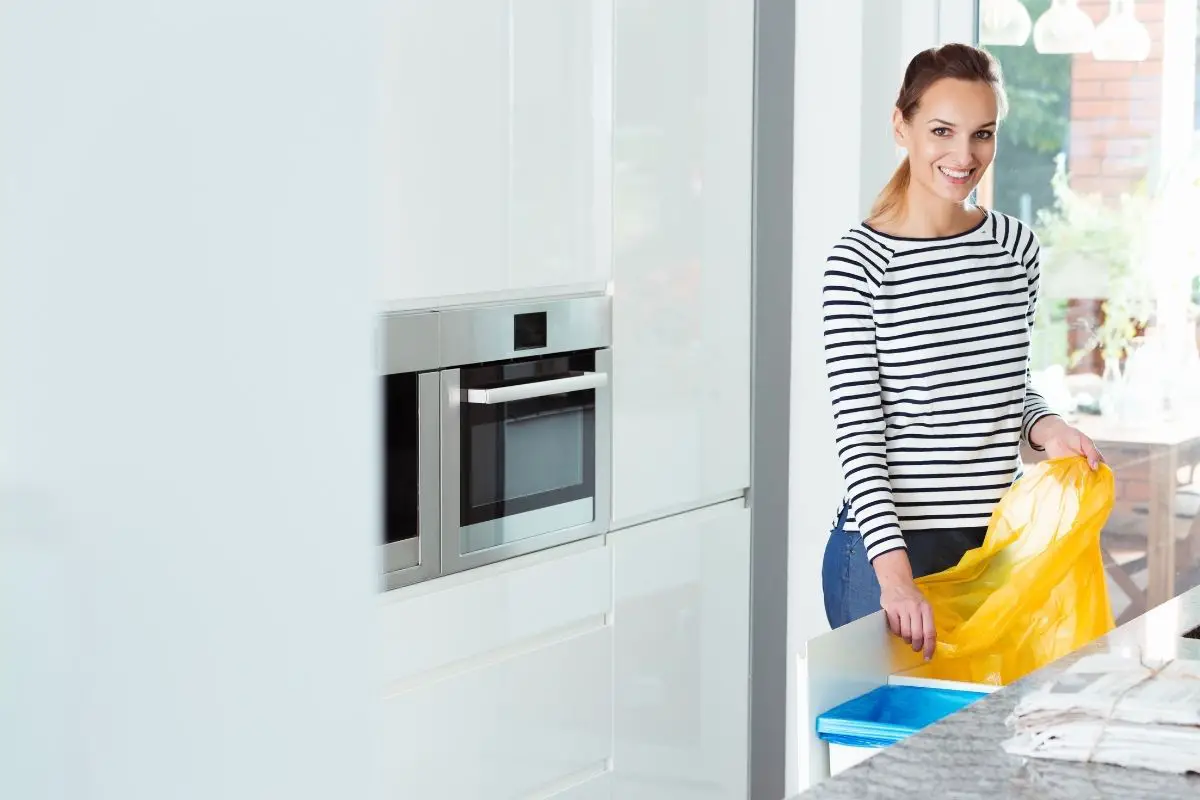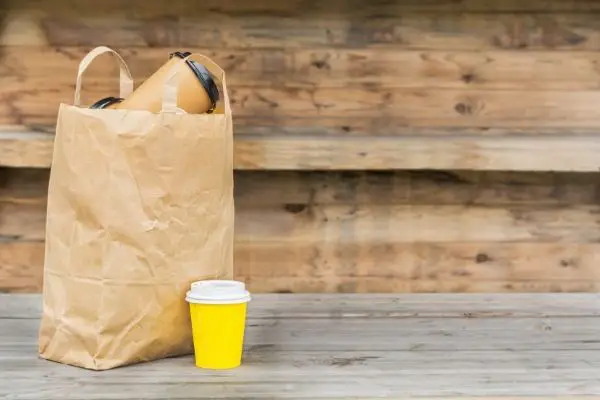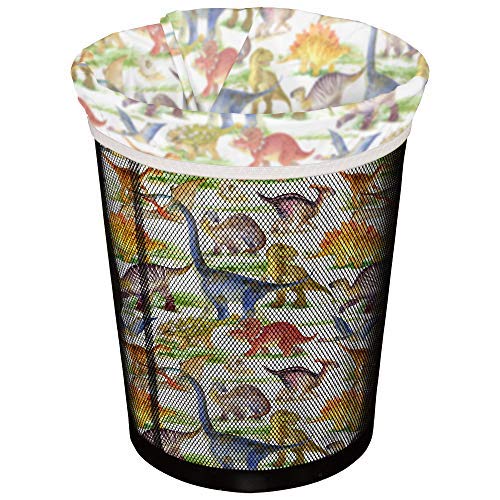Alternatives To Plastic Garbage Bags
Between my eco-conscious self and stores not easily giving free shopping bags with every purchase, I found myself finally (and slowly) transitioning to a plastic-free garbage can.
I must admit the initial scarcity of plastic bags led me – an Enviromon – to buying plastic bin liners!!! I was not proud of that at all.

In fact, when going through the supermarket aisles, I would first have a look around to see if anyone was paying attention to me, then, very quickly I would get the silly bags from the shelf and, finally, bury them under other groceries! I felt I was committing one of the worst possible eco-sins!
I decided I needed to act and change – quickly!
First thing, I upgraded our compost to a Bokashi style. Compared to traditional compost, the Bokashi method allows you to throw just about any type of food (or organic matter) in the compost – not just fruit and veggies. That was an important step towards having a ‘cleaner’ and dry garbage.
That did not completely eliminate my bag purchase, but it was drastically reduce. I also looked for the ‘best possible’ liner!
I found Seventh Generation bags to be one of the best because they’re made with 55% recycled plastic content. Although not perfect – is better than the alternative.
While I have been using these for a while I am realizing I need to do more, so my research below is everything I found that can help us all stop using true plastic bags for our garbage bags.
Alternatives To Plastic Garbage Bags
Below are a variety of choices you can make to help reduce the use of plastic bags in your home. We hope you can find one that will work for your family!
Paper Bags
Although traditional paper bags are made from trees – and the process they go through to become paper bags creates pollution, there are more eco-friendly options you can opt to use.
If you would like to use paper garbage bags be sure you are using bags that are 100% recycled paper.

The one issue I had in trying paper bags is the leaking! When my daughter took the bag out of the can to take it outside. Someone accidentally discarded raw chicken in the bag which then dripped all over our FLOR carpet tiles, thankfully clean up of those was easy. But this incident kept me from using paper bags again.
Plastic Bags
There are better plastic bag options than those you get from the store. If you still prefer to use plastic bags just make sure you get 100% recycled plastic bags which are not that easy to find.
One that we love comes from Grove Collaborative which features a 100% post-consumer recycled plastic garbage bag. The bags are made in the US and for every 50 rolls of trash bags sold, they will work with Living Lands and Waters to remove 1 pound of garbage from America’s rivers.
Reuse The Bags You Have
Think about all of the other “bags” you have around the house that can be used as mini garbage bag.
- Pet food bags
- Cheese bags
- Retail store bags
Reusable Trash Bags
I actually had no idea these were a thing – but they are! Reusable Trash Bags are trash bags you can reuse in your garbage can. They are waterproof and washable ensuring you limit your waste and reduce your carbon footprint.
Below are a few great options to consider.
Planet Wise Reusable Trash Bag

Reusable trash bags are a great way to reduce your environmental impact. Planet Wise trash bags are machine washable, water resistant, anti-bacterial and can fit 5 gallon garbage pails from 26″-34″ in diameter. They come in a variety of designs to look great in any home too! They also have a 13 gallon option as well!
K.A.N Reusable Garbage Bag

Eco-friendly and made from recycled canvas the K.A.N bags are easy to clean in the washing machine and are extremely durable. Bags are leak free, water proof and have handles for easy moving around. 13 Gallon bags fit under the counter garbage pails perfectly.
Just Go Bagless
This is the choice I made and have been successfully doing it for about 3 months now.
Seriously, why do we feel the need to use any type of bag in our garbage cans? The reality is going bagless is really the only true way of being better to our world since no product needs to be made!
I know, you are probably already feeling squeamish at the thought of this, but think about the good you will be doing. Yes, it may mean some extra cleaning time but that is minimal compared to the large amount of help you are offering the planet.
Tips for going bagless with the least amount of mess!
- Compost your fruits and vegetables – with Bokashi, you can compost pretty much any food, including meat bread, citrus, etc!
- Use existing plastic that comes with other items like bread or cereal bags to discard excess chicken or meat to prevent the juices from getting everywhere
By implementing the tips above you will minimize the garbage can mess meaning cleaning will be easier. To clean your garbage can just use some green cleaner and water – you should be able to do this either in your home in a large sink or outside with a hose.
Once our indoor garbage can is full we empty it into the outdoor garbage can that gets picked up weekly by our garbage man and so far we have had no issues at all with our bagless movement!
Before attempting a “bagless’ garbage option – be sure to check with your local garbage collector to make sure it is OK! Some will not pick up loose trash and do in fact require a bag.
Frequently Asked Questions
Below are what I hope are easy answers to some common questions I was finding as I was doing my research! If you have other questions, please let them in the comments and I will be sure to dig up some answers for you!
Can I use biodegradable garbage bags?
You may think that using a biodegradable plastic bag would be a good option to replace traditional plastic bags.
But biodegradable bags are NOT as good as you might believe and are very misleading. We do not recommend them as an alternative.
Take a look at the results of a study done where a biodegradable bag spent 3 years in water and soil and still kept its form and even held product in it. Clearly not a good option for any EnviroMom!
What is post consumer recycled plastic?
Recycled plastics can be made in 2 ways, post consumer and pre consumer. We typically prefer to find products that have been recycled from post consumer items.
Pre-consumer recycled materials are those that never made it into a consumers hands. For example a factory makes plastic products and trims excess from the product that falls to the floor – then takes those scraps from the floor and reuses them in other products. While still a great thing as opposed to just throwing it away, it is not as eco-friendly as post-consumer recycling.
Post-consumer recycled materials are those that do in fact make it in to a consumers hands then disposed of but then are kept from actually landing in the landfill. Most commonly these are bottles, cardboard and certain types of plastics. When a product uses post-consumer recycled products there is a much higher benefit to the environment so it is preferred.
To make the most impact on the environment try to find products that have a higher percentage of post-consumer recycling as part of their manufacturing.
Final Thoughts
Have you had any success with plastic-free garbage? I am still learning and would love to hear from other Enviromoms!
Last update on 2024-07-13 / Affiliate links / Images from Amazon Product Advertising API






The problem for a lot of folks is that they don’t have anywhere to dump out the garbage. For example, I live in an apartment building, so composting is not an option, and we can’t just toss raw garbage into the dumpsters. So lining the trash can with something is still pretty much a necessity. But I do agree that using other bags like bread bags or the bags that you get when buying hot dog or hamburger buns and so on, is a viable option. You will just need more of them compared to the regular grocery store type. I use those to line my kitchen trash can, which I think is a 3 gallon can. They fit nicely.